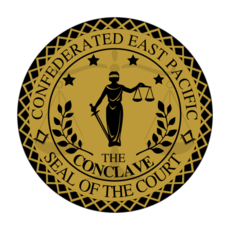— Begin quote from ____

INFORMAL VERDICT
VIA A MAJORITY VOTE OF ARBITERS, THE CONCLAVE OPINES THE FOLLOWING:
…In the matter of this advisory question, a Citizen asked for clarification on how certain provisions of the Curia Act apply to members of a “militia”, which was formed by the Overseeing Officer of the Eastern Pacific Sovereign Army in order to support an on-going EPSA operation.
…The questions specifically asked:
a) Do said militia members lose their citizenship upon moving on militia orders?
b) if said members will lose any position which requires their World Assembly nation to remain in the East Pacific.
…It should be noted that this verdict is unofficial, and therefore shall not constitute precedent in any manner or form, but rather is a non-binding opinion of the Conclave.
In order to answer the proposed questions sufficiently, the following question must first be answered:
- Is the militia operating under the Eastern Pacific Sovereign Army?
YES: The militia is operating under orders from Overseeing Officer Atlae, as well as Delegate Libertanny. Since both the Delegate and Overseeing Officer are the highest-ranking officials of the Eastern Pacific Sovereign Army, it is reasonable to assume that the militia is operating under the orders of the Eastern Pacific Sovereign Army.
FURTHER: It should be noted that the militia is organizing specifically to assist the Eastern Pacific Sovereign Army in an on-going piling operation, further reinforcing the idea that the militia is operating under Army orders.
Now, to answer the proposed questions:
- Do citizens whose citizenship nations leave the region on militia orders lose their citizenship?
NO: Citizens DO NOT lose their citizenship if their main nation is moved out due to militia operations. They are protected by Section 3.9 of the Curia Act, which states:
— Begin quote from ____
Citizens of The East Pacific will not lose their Citizenship if their nation leaves The East Pacific on the orders of the EPSA.
— End quote
It has already been established that the militia is operating under the Eastern Pacific Sovereign Army’s orders.
Due to that fact, any Citizen who moves on militia commands moves on Army orders, and therefore is eligible for the protection listed in Section 3.9 of the Curia Act.
- Do militia members who move their World-Assembly nation lose any position where being World-Assembly-locked is necessary, such as Viziers or Magisters?
YES: Anyone who moves their World-Assembly nation faces removal from any position mandating a World-Assembly nation.
The only position within the government of the East Pacific that mandates a World-Assembly nation is Viziership. Should a Vizier move their World-Assembly nation out of the East Pacific, they are failing to perform their duties as a Vizier. As stated by Article D, Section 1 of the Concordat:
— Begin quote from ____
The Viziers shall be invested the responsibilities of regional security, stability, and continuity of government. Viziers shall maintain a high level of endorsements in the region and serve for an indefinite period.
— End quote
Since a Vizier who moves their World-Assembly nation out of the East Pacific looses all of their endorsements, they may be considered absent from their position. As such, they are eligible for removal by the Conclave as specified in Article C, Section 7 of the Concordat.
HOWEVER: It should be noted that being a Magister IS NOT a position that mandates a World-Assembly nation. A World-Assembly nation is only necessary in order to join the Magisterium automatically. It should be noted that any valid citizen may join the Magisterium without a World-Assembly nation, although they are subject to a Magisterium vote if they do apply without a World-Assembly nation in the East Pacific.
Once a Citizen becomes a Magister, they may move their World-Assembly nation wherever they want (assuming they are not a Vizier). As such, anyone who is a Magister. but not a Vizier, may join the militia and participate in the militia’s military operation without loosing any of their positions.
An unofficial opinion from the Arbiters of the Conclave of the East Pacific,
represented by the Viceroy.
— End quote
